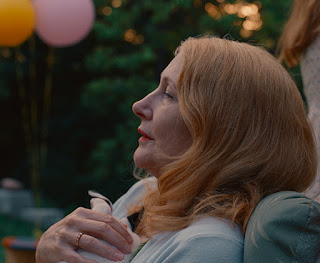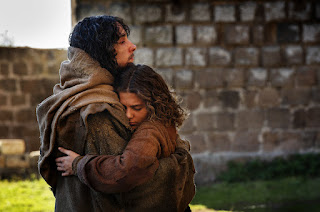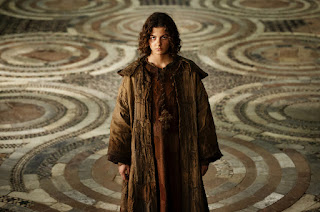Following on from yesterday's look at From Venice to London titles Chiara and The Matchmaker, today we conclude our coverage of this impressive festival edit by considering the remainder of its selections: Pippo Mezzapesa's Burning Hearts, Andrea Pallaoro's Monica, and Carolina Cavalli's Amanda. While From Venice to London—which runs from tomorrow until Monday—can only accommodate a limited number of titles, the 2023 lineup presents five very different films, which is testament to the skills of those responsible for programming the festival. In showcasing a selection of offerings from the Venice Film Festival, FVTL serves to highlight its parent event at a point when La Biennale is still a good seven months away; in this respect, it's much like the interim weekend of screenings laid on by International Film Festival Rotterdam last October. Tickets for all From Venice to London screenings can be booked by clicking here.
Italian crime drama Burning Hearts has gained a fair bit of attention in recent months, not least for its casting of pop star Elodie as the female lead. With an original title of Ti mangio il cuore, which literally translates as "I'll eat your heart", director Pippo Mezzapesa's film has found a considerably less fierce name for its release in Anglophone territories. This inventive riff on Romeo and Juliet is informed by real events, and Elodie is good value as a woman who becomes romantically involved with a member of a rival crime family; naturally, much feuding and bloodshed ensues. While Mezzapesa's film is for the most part a serious affair, there is the odd splash of humour: witness the particularly memorable scene in which a brutal gang slaying is soundtracked by noughties Eurodisco smash "Dragostea Din Tei". Captured in stunning black and white by cinematographer Michele D'Attanasio, Burning Hearts is stylish without being overwrought, and it manages to make its somewhat overfamiliar subject matter both compelling and fresh; moreover, Elodie's fine performance dispels any talk of stunt casting.
Fans of Andrea Pallaoro's Charlotte Rampling vehicle Hannah—for which the actress netted the Volpi Cup at Venice back in 2017—will surely want to be in the queue for his latest effort, the mature and moving Monica, which stars the always-watchable Patricia Clarkson. Monica is the second film in Pallaoro's thematic trilogy centring on women, of which Hannah was the first instalment. As with Charlotte Wells' Aftersun, Monica is a film in which the gap between parent and child looms large, as its title character returns home after a long absence to visit her dying, estranged mother. For more than one reason, the mother—played by Clarkson—fails to recognise her child, but Monica nevertheless sticks around to help, in the process reconnecting with her brother and forming a bond with his young family. By an extraordinary coincidence, Pallaoro's film also uses "Dragostea Din Tei" to soundtrack a key scene, and it isn't the only well-chosen song to be featured here, with classic tracks from New Order and OMD also used to fine effect. Boxing its characters into a 1:1 aspect ratio, Monica proceeds at a deliberate pace as Pallaoro consistently veers away from spelling things out for his audience, preferring instead to focus on what is left unsaid.
Carolina Cavalli's endearingly quirky debut feature Amanda, like the title character in Susanna Nicchiarelli's medieval tale Chiara, is bound to attract more than a few devoted followers; coincidentally, Amanda's star, Benedetta Porcaroli, shot to fame playing a character called Chiara in Netflix series Baby. Porcaroli's Amanda, just like her Chiara, is an entitled young woman from a wealthy family, yet despite her privileged background she drifts along as a lonely, disaffected twentysomething. Amanda's main goals are to rekindle a particular childhood friendship (that may or may not have existed) and accrue sufficient supermarket reward points to claim an electric fan; she also frequents the cinema, and opts to live in a dingy hotel room that is a far cry from her palatial family home. While the film is consistently amusing, it never loses sight of the poignancy at its core as Amanda searches for her place in what she views as a hostile, confusing world. Porcaroli gives a terrific performance, and she's matched all the way by the superb Galatéa Bellugi, who stood out in 2021's starry divertissement Tralala. Cavalli's bittersweet film is a fine choice to close this year's From Venice to London, and it announces its writer-director as a real talent.
Darren Arnold
Images: 01 Distribution / I Wonder Pictures








